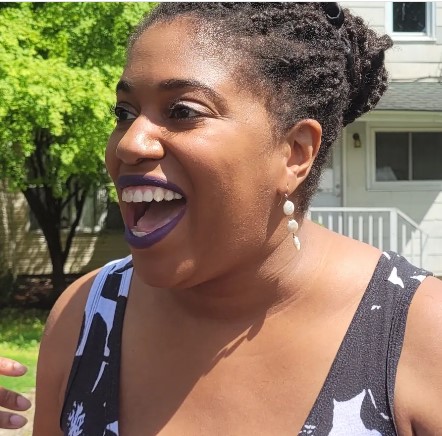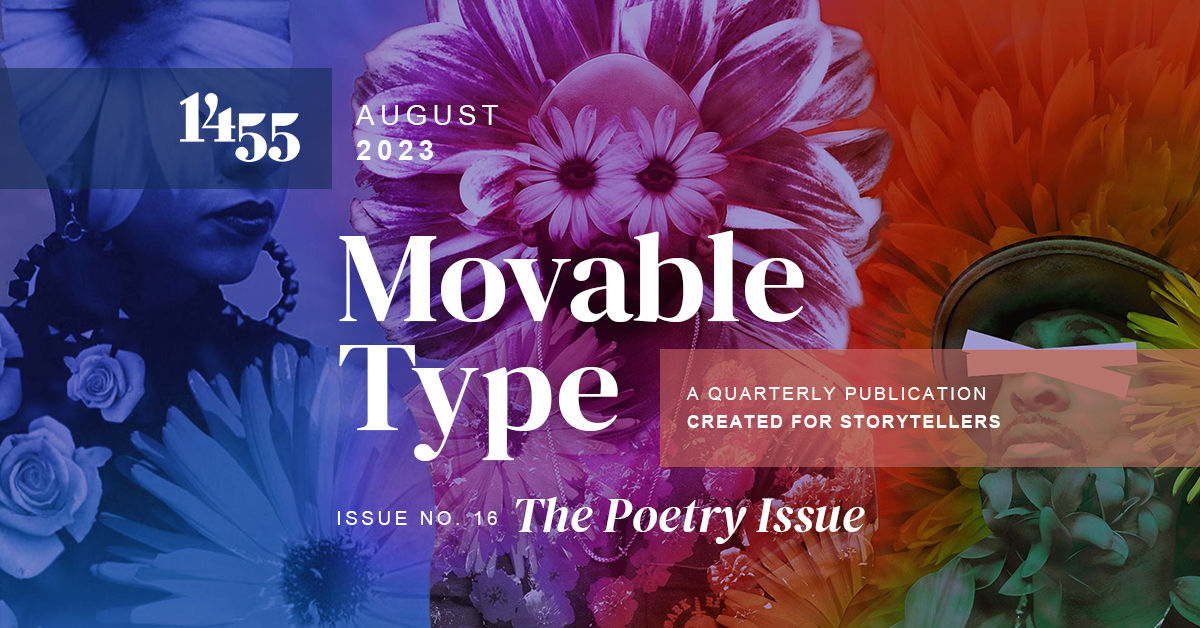Monica Prince
Poems
Insomnia, Love, and a Black Man
From Roadmap: A Choreopoem
RAVEN
In the dark, my beloved sleeps easily. I can’t imagine how.
Prone to tears in public and clutching him desperately,
I lie awake, counting my heartbeats in time
to his inhale…exhale…inhale. As a child, white spaces
enveloped me, convincing my dark body would fare safer
in the presence of the oppressors. I was wrong.
The first white boy I ever loved carried a knife to school
every day. Called it protection. Should have called it a promise
to bring a gun tomorrow. And then, he did.
He killed a boy his age over some weed—
two in the chest, one in the head. Sounded like a rap song,
a bad cop drama. I couldn’t love him anymore after
I saw what his hands were capable of, what they had always
been able to do. What privilege, an inheritance
he never questioned. Generations of bad behavior, entitlement,
and misplaced rage taught him to solve fear with violence,
to take what’s his even if it doesn’t belong to him.
The last white man I ever loved
did exactly what I expected him to do,
what every story that starts with murder must include.
He knew he could do whatever he wanted
because every man before him had done the same thing.
Of course his body could rape and pillage.
What else was it made for?
Beat.
This is not to say that white men cannot be loved.
That colored girls like me cannot open for them, produce
legacies of joy with them, plot new maps of uncharted territory,
where they can escape the damage they wreak.
No, I mean, I cannot celebrate another Loving Day
as someone’s rebellious streak, risk a racist grandparent
bleaching my baby’s skin in the bathtub, defend a ballot cast
in favor of my extermination. I mean—
I fell in love with a Black man,
and I don’t think I’ll sleep soundly ever again.
Neil enters stage right and dances with Raven for remainder of poem.
RAVEN
I worry for my beloved Black man, asleep beside me,
father of my child, someone’s son and brother and friend.
I want to keep loving him, to accept the probability
that the anger of a bitter white man might force him
out of my bed and into the ground too soon.
Love isn’t logical here, as it conquers the possibility
of irrevocable loss. I can’t help myself.
He’s just so miraculous.
Fog rolls in and The Novelist enters at the back of the room. Dorian stands and tries to catch Raven and Neil, but they are lost in each other and exit stage right too quickly.
Do Not Pray
From Roadmap: A Choreopoem
Originally published in American Poetry Journal in 2020; now appears in Roadmap
When they find my body between drywall and insulation,
or my throat slit like a second smile, or my guts writhing
on ashy sidewalk, or my fingers digesting in the stomach
of some man, or my spine gunfire-curled, or my eyes
missing—when it is too late to ask why I was alone,
or near water, or not wearing a bulletproof vest, or not studying
with my friends, or not taking out the garbage, or not home
watching sitcoms with my sister—do not ask who killed me.
Rather, dig into your own rotting cells. Ask what weapon
removes and loses children like me. Exhume the graves of my mothers.
Do not lay pennies at my fathers’ feet, apologize into cameras, or
bury me with flowers. There is not enough gold to cover silence.
Not enough water to erode sin. I do not want your hashtags,
your legislature, your promises. No movement ever saved
melanin splattered on the city’s walls. When they find me,
lit on a mountain signaling God to take us back—
do not pray.
Political Poem as Prayer
I hate the rain. Always have.
Petrichor doesn’t excite me, just signals
that today, I must wear higher heels
to keep puddles off my ankles.
Say, when a perspicacious lover asks
why droplets from the sky spark vitriol
instead of thrill, something about
water outside my control reminds me
of graveyards, of acres they call
a wasteland not because nothing grows
in the ruined soil but from all the potential
wasted under romantic moonlight.
When you began this poem, I doubt
you expected the Middle Passage,
the ivory bones of ebony people frozen
in the sands gracing the Atlantic’s floor.
Enjoy the sonder of this poet
making rain political, just like
the farmer who won’t grow orchards
or the child who never learns to whistle.
You think it’s serendipity you landed here,
eyes on this page, scanning for references
to slavery and racism. Imagine my trepidation
to continue, to find some levity
among all this destruction. If I add
sugar here, will you think sweet tea
or cane fields? How about tire swings—
childhood nostalgia or the strength
of a hickory branch strangled by a rope
dangling strange fruit? I can do this all day.
Political poetry mistaken as soliloquy,
as eulogy, as prayer. Each stanza
rendering guilt when what I really want
is peace. No, justice. To confront
the lackadaisical performance of allyship,
beg for the lives of others
anywhere but from inside the dragon’s belly.
I know we’re back where we started—
fearful of things I can’t control—and yet,
the poem demands sacrifice,
to bear witness as Matriarchs Fulton,
Till-Mobley, Reed-Veal stand
by the graves of their children,
open caskets, daring justice to swing forth
when none shall come. I want it to end, too—
cannot grieve like this every morning,
expecting you to remember the murdered’s names
alongside those of their parents’. But too often
I find myself exhausted, caught
in the rain, waters rising too quickly,
asking with every bubble of air
that makes it to the surface—
How much longer?
How much longer?

In this radical twenty-first century choreopoem, Dorian, a young American Black man, is tasked by an ancestral spirit to thwart his inevitable murder. He traces his family tree, from his grandmother to his offspring, uncovering secrets of sex work, self-harm, and assault alongside snapshots of #BlackBoyJoy. Guided by The Novelist, an omniscient muse, and her troupe of dancers, Dorian must interrogate his legacy, forgive his past, and reckon with being Black in modern America. He tries on different selves and possible futures in his increasing desperation to experience the luxury of growing old and finding solace despite institutional racism declaring him a threat. Through the poetry, dance, and song of Roadmap, will Dorian overcome the odds or become another hashtag?

Monica Prince teaches activist and performance writing and serves as Director of Africana Studies at Susquehanna University in Pennsylvania. She is the author of Roadmap: A Choreopoem, How to Exterminate the Black Woman: A Choreopoem, and Letters from the Other Woman, and the co-author of the suffrage play, Pageant of Agitating Women, with Anna Andes. Her work appears in Wildness, The Missouri Review, The Texas Review, The Rumpus, MadCap Review, American Poetry Journal, and elsewhere. A Pushcart Prize and Best of the Net nominee obsessed with maxi skirts with pockets and yoga, Prince writes, teaches, and performs choreopoems across the nation.
Website: monicaprince.com
Twitter: @poetic_moni
Instagram: @poetic_moni
Facebook: facebook.com/MonicaPrinceChoreopoet


